Remembering women the on 50th anniversary of Pacem in Terris
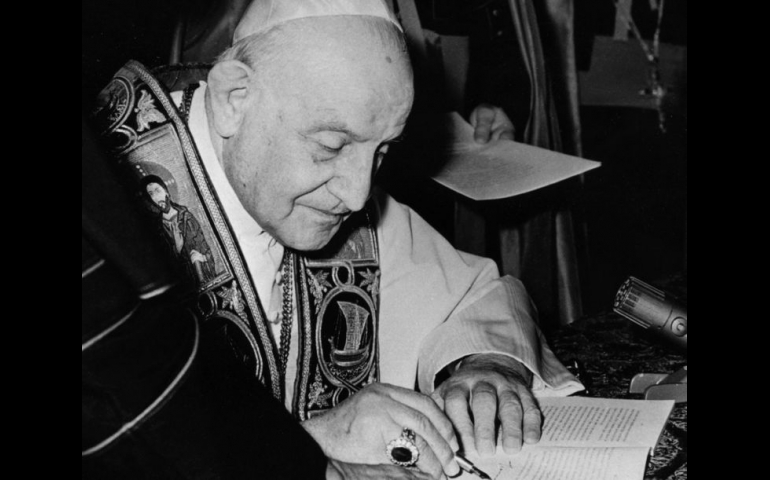 On April 11, 1963, Pope John XXIII issued Pacem in Terris - Peace on Earth. He died two months after he issue this ground breaking encyclical. The letter addresses human relationship that includes the rights and duties of all peoples; between people and government; the need for international equality among countries, peoples and communities and collaboration and care giving between nations, Christians and non-Christians within political and socio-economic structures.
On April 11, 1963, Pope John XXIII issued Pacem in Terris - Peace on Earth. He died two months after he issue this ground breaking encyclical. The letter addresses human relationship that includes the rights and duties of all peoples; between people and government; the need for international equality among countries, peoples and communities and collaboration and care giving between nations, Christians and non-Christians within political and socio-economic structures.
Long story short, we belong to God and one another and we need to think and behave like we do if we expect peace in our homes, in our communities and on this earth. That's the nutshell version of Pacem in Terris. The encyclical still resonates with relevance, truth, beauty and vision. (Read Pacem in Terris here.)
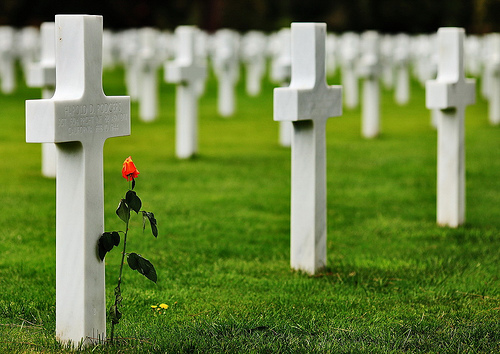 I read Pacem in Terris years ago. To mark its anniversary, I decided to re-read the text and reflect on how this prophetic letter speaks to us here and now. What's changed in fifty years since John XXIII penned this text? Worldwide wars still rage and ravage countries and communities and steal thousands of lives, leaving a wake of bereaved and damaged communities in their stead. Political strife continues to polarize governments. Polemics exist within structural religion. Socio-cultural developments and economic imbalance continues to plague the majority of earth's population, challenging individuals, families and communities with more and more duress, which play out in the state of peoples' mental, physical and spiritual wellness. Do we keep repeating the same mistakes over and over again? Lyrics from a Pete Seeger tune that I used to sing in the '60's popped into my head: "When will they ever learn; when will they ever learn." (Where Have All the Flowers Gone)
I read Pacem in Terris years ago. To mark its anniversary, I decided to re-read the text and reflect on how this prophetic letter speaks to us here and now. What's changed in fifty years since John XXIII penned this text? Worldwide wars still rage and ravage countries and communities and steal thousands of lives, leaving a wake of bereaved and damaged communities in their stead. Political strife continues to polarize governments. Polemics exist within structural religion. Socio-cultural developments and economic imbalance continues to plague the majority of earth's population, challenging individuals, families and communities with more and more duress, which play out in the state of peoples' mental, physical and spiritual wellness. Do we keep repeating the same mistakes over and over again? Lyrics from a Pete Seeger tune that I used to sing in the '60's popped into my head: "When will they ever learn; when will they ever learn." (Where Have All the Flowers Gone)
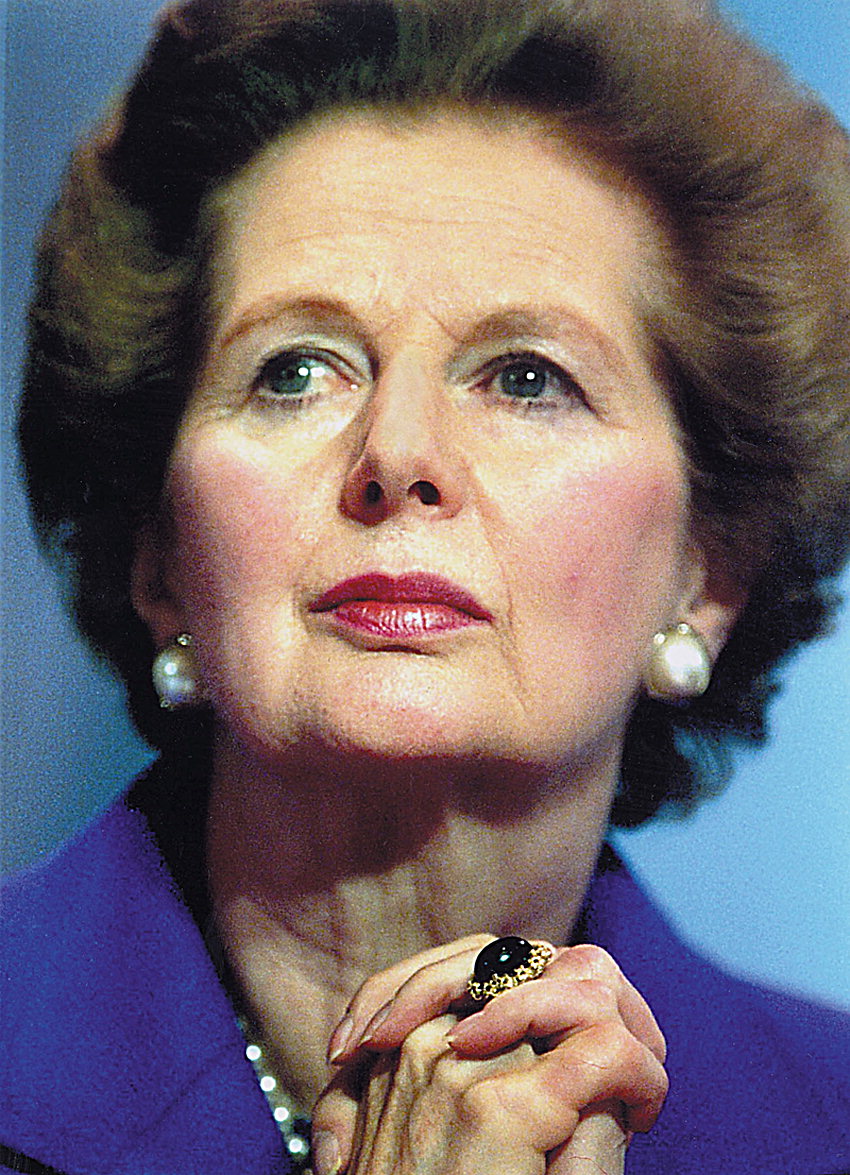 As I began to plumb Pacem in Terris on Monday, Lady Margaret Thatcher died. I ruminated on the Iron Lady's career spanning her early and formative years as a grocery clerk in her civic minded father's store to her position as Britain's first female prime minister. At the same time, a passage in Pope John's letter caught my attention, evoking memories of other women leaders besides Thatcher who created change - female peacemakers that claimed the rights and duties that befit their human personhood.
As I began to plumb Pacem in Terris on Monday, Lady Margaret Thatcher died. I ruminated on the Iron Lady's career spanning her early and formative years as a grocery clerk in her civic minded father's store to her position as Britain's first female prime minister. At the same time, a passage in Pope John's letter caught my attention, evoking memories of other women leaders besides Thatcher who created change - female peacemakers that claimed the rights and duties that befit their human personhood.
"The part that women are now playing in political life is everywhere evident. This is a development that is perhaps of swifter growth among Christian nations, but it is also happening extensively, if more slowly, among nations that are heirs to different traditions and imbued with a different culture. Women are gaining an increasing awareness of their natural dignity. Far from being content with a purely passive role or allowing themselves to be regarded as a kind of instrument, they are demanding both in domestic and in public life the rights and duties which belong to them as human persons." Pacem in Terris, 41.
That paragraph led me to ponder Margaret Thatcher's legacy as a peacemaker within the context of Pacem in Terris and likewise reflect on other female leaders who followed their internal voice and wore the yoke of leadership in a specific time of history. I begin with the controversial figure of Margaret Thatcher who Britain will memorialize and bury this week
Remembering Margaret
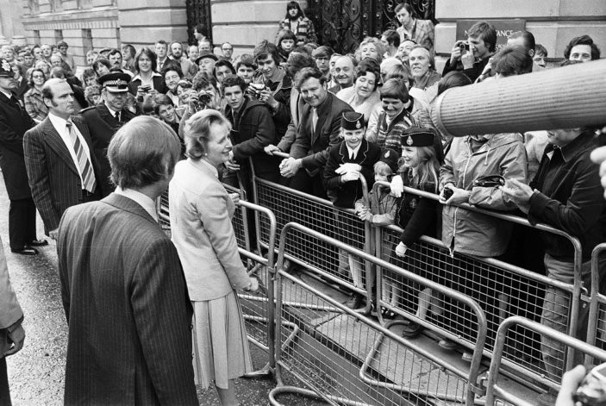 Thatcher arrives for her first day at 10 DowningWhen Margaret Thatcher, "MT" as her husband Dennis called her, arrived on the job as Britain's first female prime minister at 10 Downing in 1979, throngs of people cheered their approval and support of the 'Iron Lady,' a name she adopted from a Soviet journalist who dubbed her so for her uncompromising leadership style. Before she entered 10 Downing, she greeted the people and gave a brief speech that included a peace prayer usually attributed to St. Francis of Assisi. I encourage you to go to the Margaret Thatcher archives here for a brief, poignant read of how Lady Thatcher and her speech writer Sir Ronnie Millar arrived at the final text of that famous speech and why they used that particular prayer.
Thatcher arrives for her first day at 10 DowningWhen Margaret Thatcher, "MT" as her husband Dennis called her, arrived on the job as Britain's first female prime minister at 10 Downing in 1979, throngs of people cheered their approval and support of the 'Iron Lady,' a name she adopted from a Soviet journalist who dubbed her so for her uncompromising leadership style. Before she entered 10 Downing, she greeted the people and gave a brief speech that included a peace prayer usually attributed to St. Francis of Assisi. I encourage you to go to the Margaret Thatcher archives here for a brief, poignant read of how Lady Thatcher and her speech writer Sir Ronnie Millar arrived at the final text of that famous speech and why they used that particular prayer.
Sir John Major, who served in Thatcher's cabinet and followed  The Grand after the bombing her as Britain's prime minister believes that Thatcher "will rise up among the tall trees of peacemakers in the history of Britain's prime ministers."
The Grand after the bombing her as Britain's prime minister believes that Thatcher "will rise up among the tall trees of peacemakers in the history of Britain's prime ministers."
Thatcher weathered many political storms within Parliament, in Britain and within that period of history of the world.
Despite opposition from her cabinet, Parliament and British allies, she retrieved the Fauklands from the Argentinian Junta.
Through her partnership with Mikhail Gorbachev and other world leaders, including Pope John Paul II, Margaret Thatcher helped to end Communism.
She survived the torrential violence of the IRA, which included the assassination of her campaign manager Airey Neave in a car explosion claimed by the IRA, as well as a bombing directed at Thatcher on the Grand Hotel, where she stayed in Brighton during the Conservative Party conference in 1984.
In 1985, Thatcher helped to negotiate peace and put an end to that period that Ireland named "The Troubles," assisting with the negotiations of the Anglo-Irish Agreement.
Another MT
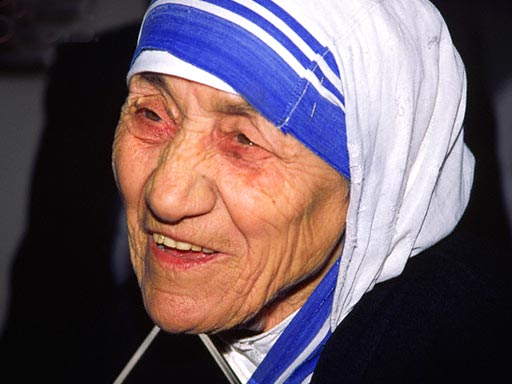 Mother TeresaDuring the time that Margaret Thatcher became a powerful figure within world history, another "MT" entered the world scene of international peacemakers. Mother Teresa of Calcutta emerged as an international figure in the 1980's although she began her work and founded her religious order, the Missionaries of Charity many years prior.
Mother TeresaDuring the time that Margaret Thatcher became a powerful figure within world history, another "MT" entered the world scene of international peacemakers. Mother Teresa of Calcutta emerged as an international figure in the 1980's although she began her work and founded her religious order, the Missionaries of Charity many years prior.
As a peacemaker, Mother Teresa negotiated with political figures from all around the globe. Highlights include the Siege of Beirut in 1982. Mother Teresa led some of her sisters to rescue 37 children trapped in a front line hospital by negotiating a temporary cease-fire between the Israeli army and Palestinian guerrillas. Accompanied by Red Cross workers, she crossed through the war zone to the destroyed hospital to evacuate the young victims and cared for them throughout their recovery.
When Eastern Europe experienced an open mindedness in the late 1980s, she amplified her efforts to work with Communist countries that previously denied access the Missionaries of Charity and seized the window of opportunity to create many projects in that region.
Mother Teresa ignored the dangers in Africa and assisted the hungry in Ethiopia, radiation victims at Chernobyl and earthquake victims in Armenia.
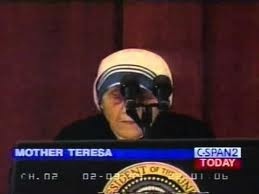 Mother Teresa addresses UN AssemblyIronically, Mother Teresa offered the same prayer as Margaret Thatcher when she addressed the United Nations on its 40 Anniversary with the theme, "One Strong Resolution: I Will Love," invoking the peace prayer associated with St. Francis of Assisi. The difference between the two women? Margaret Thatcher used half the prayer; Mother Teresa included the full text and invited the leaders in the General Hall Assembly to pray with her from the prayer cards that had been distributed to the members of the United Nations ahead of her arrival. (Read the short but intrepid full text of Mother Teresa's speech to the UN.)
Mother Teresa addresses UN AssemblyIronically, Mother Teresa offered the same prayer as Margaret Thatcher when she addressed the United Nations on its 40 Anniversary with the theme, "One Strong Resolution: I Will Love," invoking the peace prayer associated with St. Francis of Assisi. The difference between the two women? Margaret Thatcher used half the prayer; Mother Teresa included the full text and invited the leaders in the General Hall Assembly to pray with her from the prayer cards that had been distributed to the members of the United Nations ahead of her arrival. (Read the short but intrepid full text of Mother Teresa's speech to the UN.)
Women prophets of peace
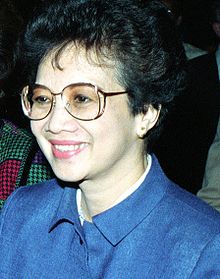 Corazon AquinoCorazon Aquino, 11th president of the Philippines and the first female to hold that office in Asia restored democracy to her country as her strong leadership gave voice to civil liberties and human rights. She successfully held peace talks with communist insurgents and Muslim secessionists and restored economic health by creating a market oriented and socially responsible economy of the Philippines.
Corazon AquinoCorazon Aquino, 11th president of the Philippines and the first female to hold that office in Asia restored democracy to her country as her strong leadership gave voice to civil liberties and human rights. She successfully held peace talks with communist insurgents and Muslim secessionists and restored economic health by creating a market oriented and socially responsible economy of the Philippines.
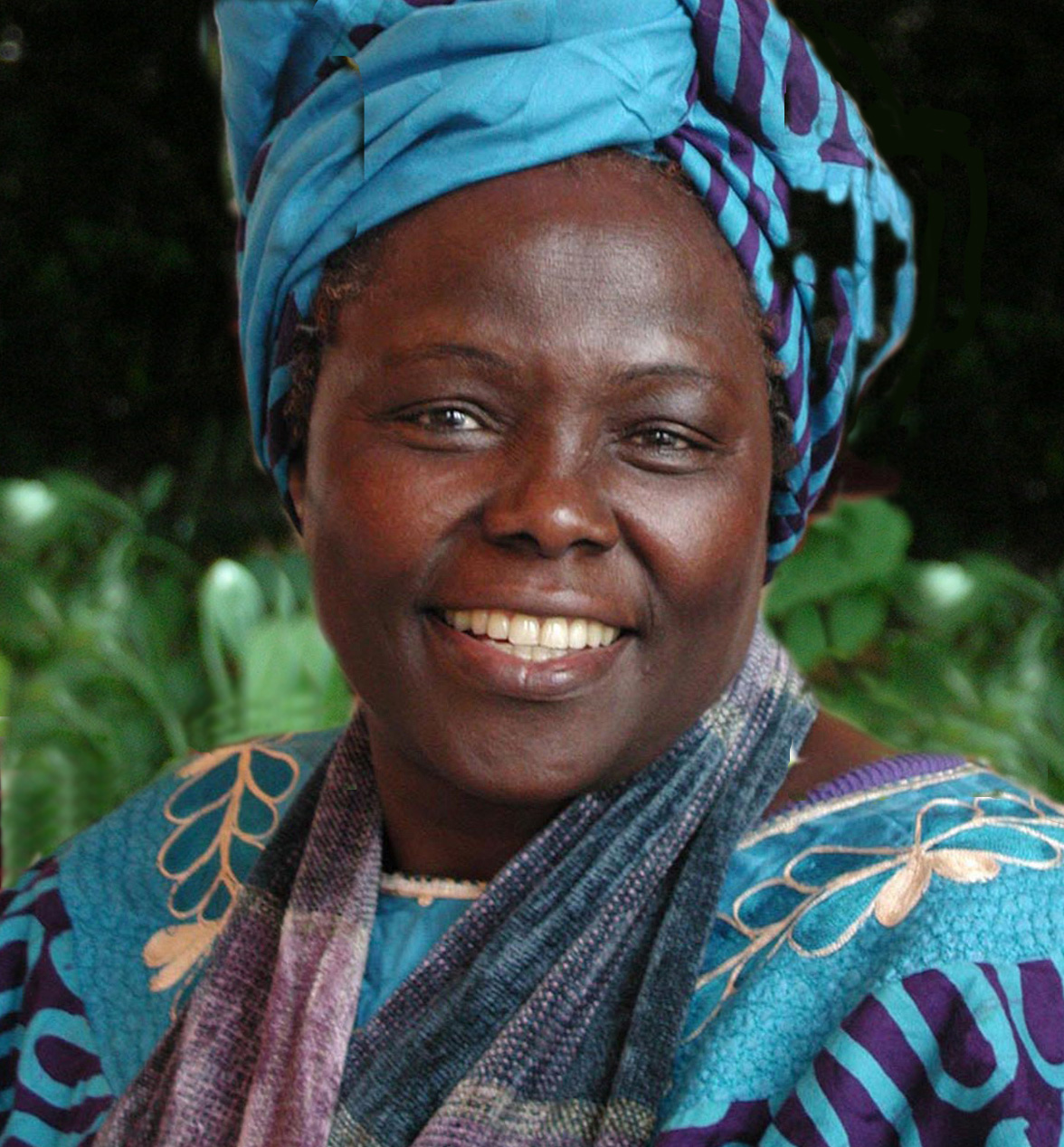 Wangari Maathai Wangari Maathai promoted ecologically viable social, economic and cultural development in Kenya and in Africa, standing up against the oppressive regime in Kenya.
Wangari Maathai Wangari Maathai promoted ecologically viable social, economic and cultural development in Kenya and in Africa, standing up against the oppressive regime in Kenya.
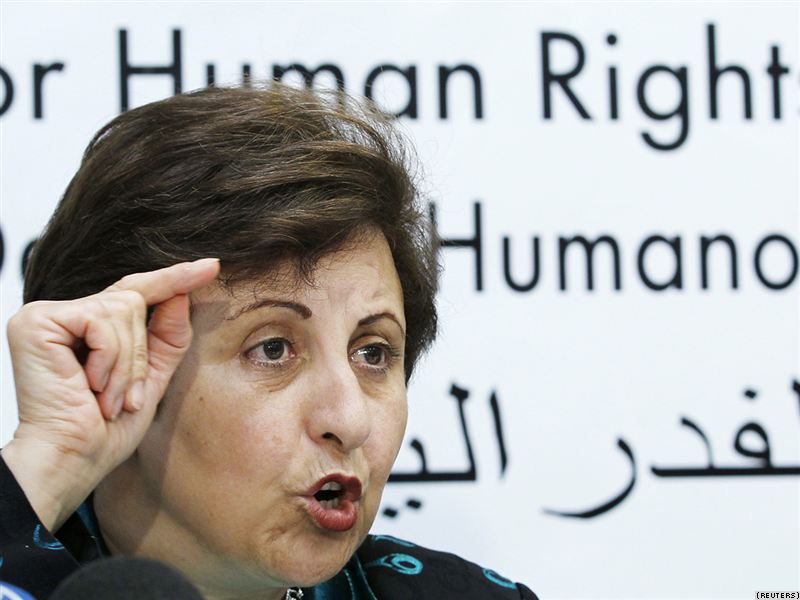 Shiri EbadiShiri Ebadi drives the force of the reform of family law in Iran and became the country's first female judge.
Shiri EbadiShiri Ebadi drives the force of the reform of family law in Iran and became the country's first female judge.
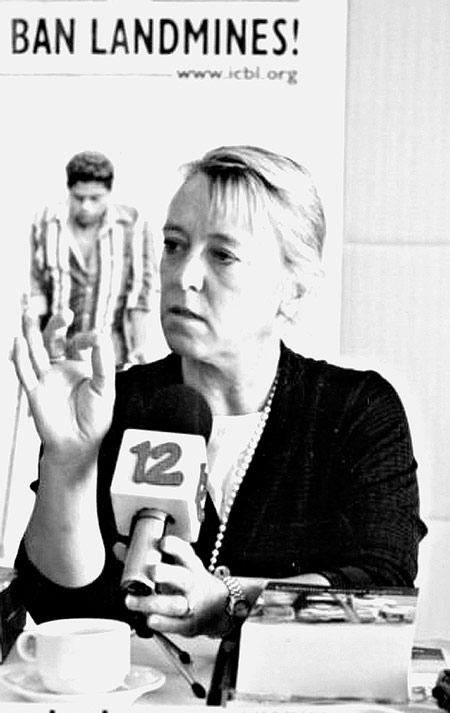 Jodi WilliamsJodi Williams led the campaign to ban landmines (ICBL) and successfully created the Ottawa Treaty, which outlaws their production.
Jodi WilliamsJodi Williams led the campaign to ban landmines (ICBL) and successfully created the Ottawa Treaty, which outlaws their production.
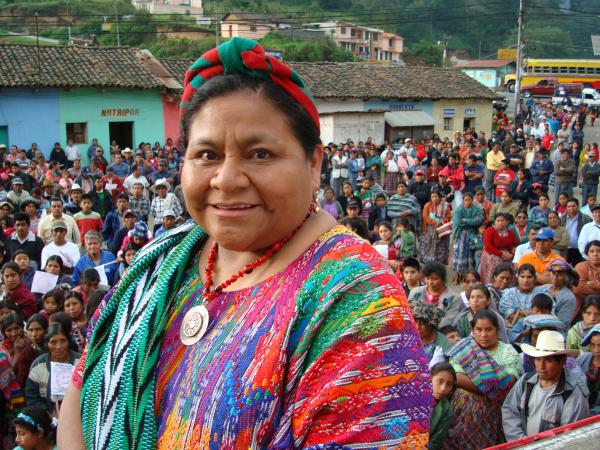 Rigoberta Mench Tum Rigoberta Mench Tum negotiates peace as a Guatemalan Indian-rights activist. A Mayan Indian of the Quich group, Tum led the resistance against the abuses of the military government.
Rigoberta Mench Tum Rigoberta Mench Tum negotiates peace as a Guatemalan Indian-rights activist. A Mayan Indian of the Quich group, Tum led the resistance against the abuses of the military government.
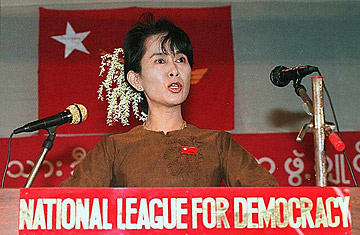 Aung San Suu KyiAung San Suu Kyi of Burma created the National League for Democracy and became became a symbol of peaceful resistance when the junta placed her under house arrest after she ran and won more than 80% of the parliamentary seats.
Aung San Suu KyiAung San Suu Kyi of Burma created the National League for Democracy and became became a symbol of peaceful resistance when the junta placed her under house arrest after she ran and won more than 80% of the parliamentary seats.
Alva Myrdal from Sweden advocated for nuclear disarmament with Mexican leaders as a government worker and diplomat.
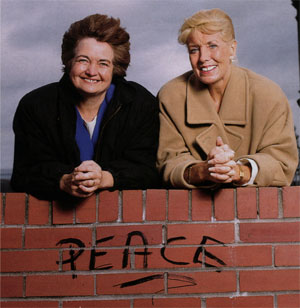 Mairad Corrigan and Betty Williams During "The Troubles" in Ireland, Mairad Corrigan and Betty Williams founded the Northern Ireland Peace Movement (now named the Community of Peace People) when they witnessed a car veer off the road and Corrigan's sisters three young children died due to a high speed chase by the IRA. Through their leadership, thousands of Catholics and Protestants met and demanded peace in Ireland and the end to violence.
Mairad Corrigan and Betty Williams During "The Troubles" in Ireland, Mairad Corrigan and Betty Williams founded the Northern Ireland Peace Movement (now named the Community of Peace People) when they witnessed a car veer off the road and Corrigan's sisters three young children died due to a high speed chase by the IRA. Through their leadership, thousands of Catholics and Protestants met and demanded peace in Ireland and the end to violence.
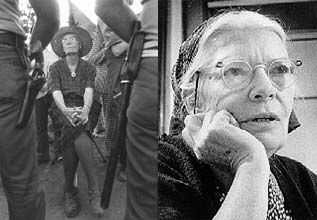 Dorothy DayDorothy Day advocated the Catholic economic theory of distribution and founded The Catholic Worker Movement as a nonviolent, pacifist movement that gives direct assistance to the poor and homeless in houses of hospitality.
Dorothy DayDorothy Day advocated the Catholic economic theory of distribution and founded The Catholic Worker Movement as a nonviolent, pacifist movement that gives direct assistance to the poor and homeless in houses of hospitality.
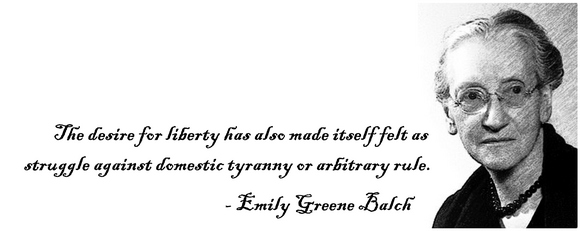 Emily Greene BalchEmily Greene Balch, an American sociologist, political scientist, economist and pacifist led the women's movement for peace during and after the First World War.
Emily Greene BalchEmily Greene Balch, an American sociologist, political scientist, economist and pacifist led the women's movement for peace during and after the First World War.
Great personal sacrifice
"Far from being content with a purely passive role" (PT 42) these women and others in the last 100 years possessed strength of purpose and the passionate desire to work for the common good, to create change, sometimes at great personal sacrifice. No leader escapes without personal loss or error of judgment even as they spend every waking minute thinking and acting on behalf of the people they serve. Let those among us tempted to judge and without sin cast the first stone.
The themes of peace, justice and human rights sing within the socio-political activity of these women. The "force of nature" that Pacem in Terris describes in its introduction seized these committed female leaders to do something to become the voice of change for the good in their time. Dissatisfied with a content life, all of these women were driven by their zeal to create peace within social structures that existed due to the "longstanding inferiority complex of certain classes because of their economic and social status, sex, or position in the State, and the corresponding superiority complex of other classes."
In the hopeful spirit of Pacem in Terris, may this kind of structural dysfunction and injustice is become a memory in our history. May women everywhere respond to their interior call as peacemakers in their homes, their workplaces, their governments, their churches, the communities and the world. And may all of those structures open wide their doors to the gifts of women in the spirit of justice, human rights and equal opportunity so that we realize their gifts, which come from God, can benefit us all as we continue to work and pray for peace on earth.
 Denise Morency Gannon
Denise Morency Gannon
Reader Comments